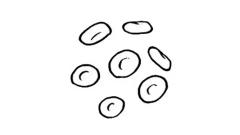
Mechanism of Action Influences Sequencing of Systemic GVHD Therapies
Noah M. Merin, MD, PhD, discusses the mechanisms of action and sequencing of oral therapies for chronic graft-vs-host disease (GVHD) in a live virtual event.
Episodes in this series

Noah M. Merin, MD, PhD, assistant professor at Cedars-Sinai Medicine and medical director of the Hematology and Cellular Therapy Disease Research Group at the Cedars-Sinai Cancer Institute, discusses the mechanisms of action and sequencing of oral therapies for chronic graft-vs-host disease (GVHD) in a live virtual event.
When looking at the cellular pathways involved in activating graft immune cells that cause GVHD, he first noted the role of ruxolitinib (Jakafi), a JAK1/JAK2 inhibitor, on the JAK/STAT pathway to downregulate cytokine production. Ruxolitinib would be his first choice for steroid-refractory acute GVHD or chronic GVHD. Next looking at ibrutinib (Imbruvica), he said it has a different adverse event profile from ruxolitinib and acts on the BTK (Bruton tyrosine kinase) signaling molecule to deactivate cytotoxic T cells responsible for GVHD. Merin said he would use it in patients whose disease did not respond to ruxolitinib.
The third approved therapy, belumosudil (Rezurock), is a ROCK2 inhibitor that acts downstream of integrins and growth factors that cause proliferation of T cells. Merin said he would normally use it after ruxolitinib and ibrutinib, but it is also especially effective in patients with GVHD of the lung, which would also be a sequencing consideration.
TRANSCRIPTION
0:10 | Ruxolitinib is usually my first choice for acute GVHD that is steroid refractory, and often I'm using it again if patients develop chronic GVHD. It also [has] a different side effect profile than ibrutinib.
0:25 | [The JAK/STAT pathway] is the first step of activation of immune cells [with] the cytokine receptors, and [ruxolitinib] inhibits that step. So if it doesn't work and I'm treating chronic GVHD, my next choice would be to work on—to use a drug that—this is the B cell receptor. Downstream from the B cell receptor is a signaling molecule called BTK. This is a T cell receptor, downstream from that is ITK [interleukin-2–inducible kinase] and ibrutinib blocks that. So if your B cell or T cell has already gotten exposed to cytokines, and it's destined to become an alloreactive immune cell; it's going to proliferate, it's going to put out antibodies, it's going to turn into a cytotoxic T cell, then ibrutinib can turn those cells off, because it's already cells that have already encountered their antigens and have been activated. So I use ibrutinib after patients progress on ruxolitinib for chronic GVHD.
1:30 | Then the third drug in the lineup is belumosudil. So belumosudil is a ROCK2 inhibitor. ROCK2 is a signaling molecule that's downstream from integrins, which help immune cells bind to the vascular wall and migrate into areas where they're going to go and cause GVHD, and...growth factors that turn on T cells and make them proliferate. I use belumosudil in the third situation, if patients have progressed on ruxolitinib or ibrutinib, and it's particularly good for lung GVHD. It appears to have some benefit in lung GVHD. So in patients with lung GVHD, I'm trying to get them on belumosudil. That's how I divide up, [and] how I choose among the FDA approved oral therapies for chronic GVHD.













































